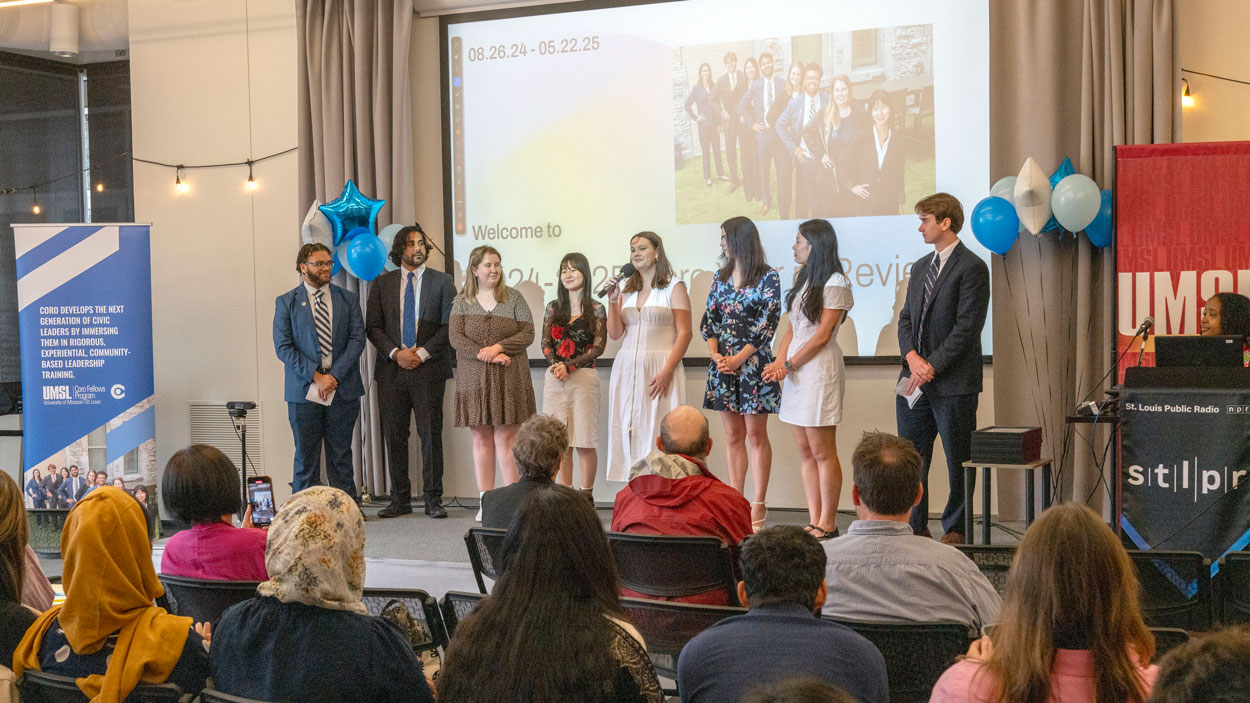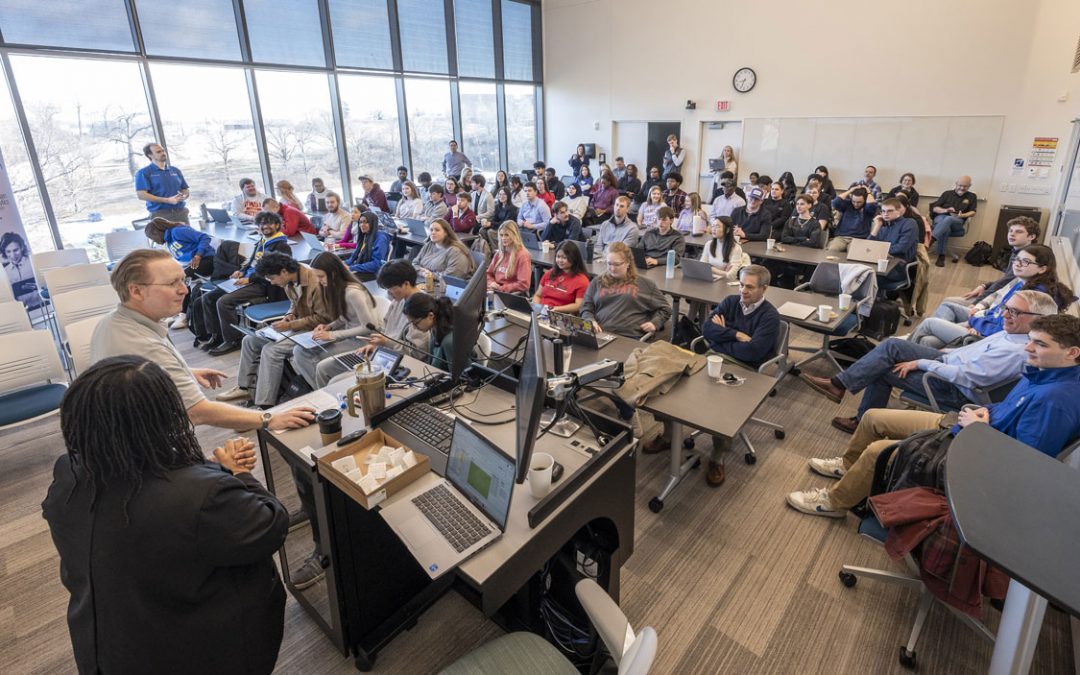
St. Louis Coro Fellow Kate Hodgin addresses the audience last Thursday in the community room at UMSL at Grand Center while the other members of her cohort (from left) Brad Williams, Alawi Masud, Madelon Jensen, Chae Yu, Kate Hodgin, Sierra Sabec, Rachel Chen, and Carter Stacy listen from on stage. The eight fellows celebrated their graduation from the nine-month program with family members, friends and other supporters. (Photo by Derik Holtmann)
Thursday evening provided an opportunity for reflection as Rachel Chen, Kate Hodgin, Madelon Jensen, Alawi Masud, Sierra Sabec, Carter Stacy, Brad Williams and Chae Yu celebrated the completion of the Coro Fellows Program.
Joined by family, friends and other supporters for a graduation event in the community room at UMSL at Grand Center, the latest class of St. Louis Coro Fellows took turns recalling impactful experiences they had embedded with community organizations throughout the region, insights they gained from interviewing civic leaders and lessons they will take with them as they move into the next stages of their lives and careers.
“The fellows in their program have had incredible experiences to see leadership in action across St. Louis and an opportunity to determine how they will choose to lead,” Coro Fellows Program Director Leah Moser said during welcoming remarks.
Moser described the Coro approach to leadership as inward, outward and forward.
“Fellows learn to lead by reflecting inward to cultivate self-awareness, build adaptive resilience and critical-thinking skills,” Moser said. “The fellows develop leadership to engage outward in cultivation of skills of communication, inclusion and the ability to collaborate effectively across differences. And the fellows are prepared to lead forward by using influence, impact and engagement to move toward a greater vision. The fellows have dedicated the last nine months to learning and practicing these skills that they will be able to leverage professionally and personally for the rest of their lives.”
The Coro Fellows – originally founded in San Francisco in 1942 – have a more than 50-year history in St. Louis. Since 2021, the program has been housed in the Community Innovation and Action Center at the University of Missouri–St. Louis.
The city has proved to be an ideal training ground for fellows to face complex issues and try to think through solutions.
Chen, Hodgin, Jensen, Masud, Sabec, Stacy, Williams and Yu all came to St. Louis in August from far-flung parts of the United States and, in Yu’s case, South Korea. They had almost no history with or knowledge of the city before their arrival but have tried to absorb as much as they can about its culture.
“Coro emphasizes immersing yourself in a place through inquiry and exploration,” Sabec said. “I’ve loved getting the opportunity to learn experientially about St. Louis through cultural and community events.”
Through their work over the past nine months, the fellows also learned a great deal about the city’s complicated past and modern challenges, including fractured governance and a stark divide between rich and poor.
Each fellow spent time placed in local nonprofit, government and business organizations. The nonprofits included organizations such as the Community Health Commission of Missouri, Delmar Main Street, the Clark-Fox Family Foundation, Incarnate Word Foundation and The Soulfisher Ministries. Government placements included Bi-State Metro Transit, the City of St. Louis Mayor’s Office, the Comptroller’s Office and the Planning and Urban Design Agency. Business placements included Greater St. Louis Inc., AHC Consulting and the St. Louis Anchor Action Network.
Through those placements, they were tasked with everything from assisting with after-school youth programming to updating documents describing procedures used by city departments to ensure that department processes were properly recorded to creating a housing strategy for downtown St. Louis, and much more.
They took part in Focus Weeks, in partnership with host organizations, where they dived into topics such as environmental health, accessibility, labor and state affairs and learned how they were impacting the St. Louis community. They also visited Jefferson City and met with legislators for four issue days.
The fellows had opportunities throughout the year to conduct informational interviews with more than 200 organizational and civic leaders to learn about challenges and opportunities facing the region.
To complement their experiences, they also met weekly at Delmar DivINe for seminars with trainer Jessica Wernli, where they learned tools and frameworks for professional development, inquiry and group collaboration.
Delmar DivIne is a mixed-use redevelopment of the former St. Luke’s Hospital located along Delmar Boulevard, a road often used to mark the stark divisions in St. Louis. The fellows spent significant time there and in the surrounding neighborhoods throughout their experience. It was also to be the site of their graduation event before a May 16 tornado cut a path of destruction through that part of the city and forced its relocation.
The fellows penned a letter to Delmar Boulevard, which Stacy read Thursday evening.
In concluded: “It is especially bittersweet to end our time in the fellowship now, for when we stepped outside after the skies grew clear, we saw you in pain. The streets we had traveled a thousand times were blocked, windows we had gazed out of shattered. Brick walls we had craned our necks to look up at had crumbled and trees that had shaded us from the sun lay on their side. People talk about you as a border, a dividing line, but when we saw neighbors clearing rubble from on top of you we saw no divide. When we heard the voices of strangers asking us if we were OK and the same words came from our own mouths, we heard no divide. On a walk home that sunny Friday afternoon that we will never forget, there was no Delmar Divide. Just one community, hurt but not broken, a tapestry of different lives and different stories coming together and already starting to rebuild.”














